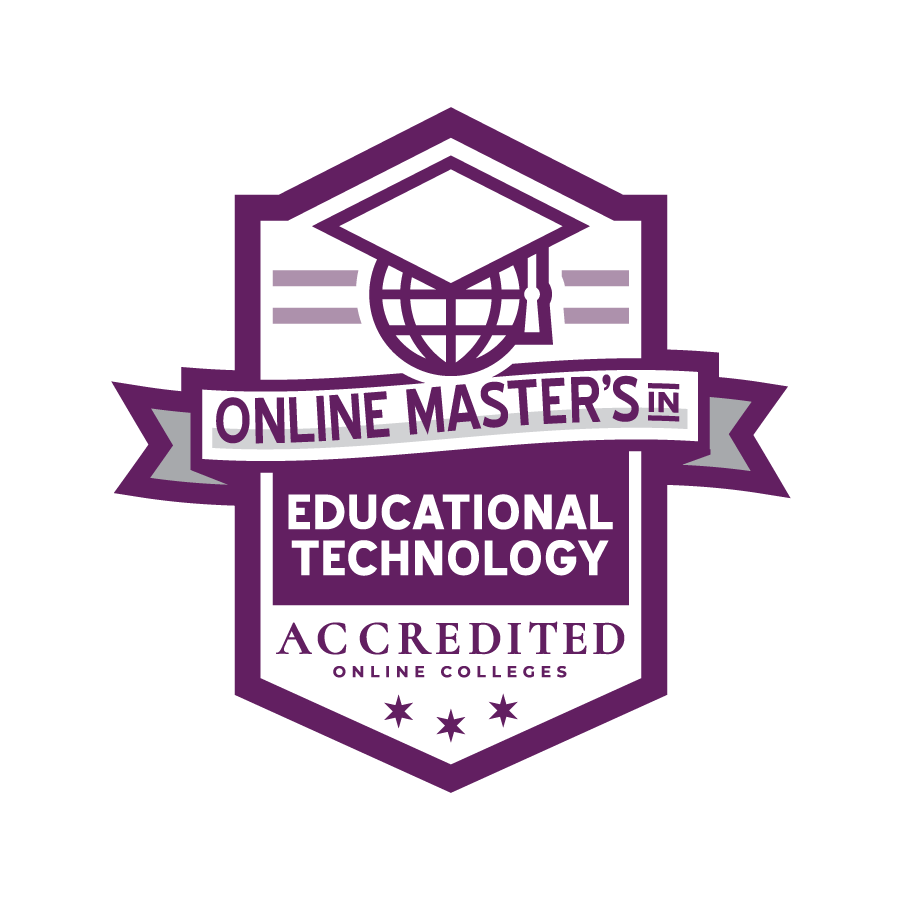The best online master’s in educational technology can help you to secure leadership positions and steer the direction of education in schools, colleges, and organizations across the country.
Graduates of a degree in educational technology tend to earn at least 150% of the national average salary annually. For positions in curriculum design and development, salaries can exceed six figures with enough experience in the field. The best online master’s in educational technology can help you to keep up to date with the most relevant and emerging technologies, and secure promotions and pay rise.
See Also: Best Online Master’s in Educational Leadership
What will you learn with this degree?
Educational technology is involved with the process of researching, designing, implementing, and evaluating learning processes and materials. Specifically, it looks at the link between new and innovative technologies and how they can be used in the classroom or training environment. The primary purpose is to improve education, training, or performance, depending on the role you’re working in.
There’s already a broad range of technology being used to achieve this goal. When we talk about these technologies, we mean, for example, projectors, computers, software applications, the internet, video conferencing, and video games. However, it takes specialist knowledge and training to understand how best to use these tools in the delivery of learning or training.
What are the Best Educational Technology Degrees?
Accredited Online College uses the most recent data from the Department of Education’s National Center for Education Statistics. Each program is scored individually. It’s then compared to all other universities offering that degree to determine the final score you see by each ranking. Accredited Online College considers the affordability, student-to-faculty ratio, and the number of programs offered on-campus and online. To learn more, visit our methodology page.
#1. University of Florida
The University of Florida offers the best Online M.Ed. in Curriculum and Instruction, which has an emphasis in Educational Technology. The program can be completed in 2 years if you enroll in 2 courses each session too. What’s more, from 2020 onward, you’ll no longer need to evidence GRE scores to be admitted to an MAE, M.Ed., or Ed.S. program!
Within this curriculum, you’ll complete a mandatory core in curriculum and instruction and another in educational technology. In addition to your chosen electives, you will also undertake a practicum, which lasts for a full 16-week semester. Other courses include:
- Instructional Computing
- Games and Simulations for Teaching and Learning
- Managing Educational Projects
Florida residents who enroll in this program will pay tuition of approximately $448.73 per credit hour. Including fees, that’s about $518.69 per credit hour. Non-residents pay a premium, though not by a long way; the part-time student tuition rate is only around $622.22 per credit hour.
See Also: Financial Aid Tips for Online College
#2. Texas A & M University-College Station
The top Master’s in Learning Design.& Technology (Online) at Texas A&M has been ranked within the top 10 programs in the nation, according to U.S. News & World Report. You’ll gain a solid understanding of instructional design and learning theory, among other topics, and you’ll open up potential careers as:
- instructional designer
- course developer
- teacher
- technology coordinator
- learning and performance specialist
Admissions take place twice yearly, and you don’t even need GRE scores to be eligible to apply. If you’re enrolled in this program, you’ll complete a total of 36 credit hours. All courses are offered online so that you can continue to work full-time while gaining your master’s degree.
In this program, all courses are delivered online. For full-time students who are taking 12 credit hours or more per semester, tuition is around $5,447.68. This rate applies to state residents, while non-residents pay around $11,801.80. This includes all fees too! You can get the most accurate estimates of your cost of attendance by using the tuition calculator.
#3. Liberty University
At Liberty University, you can enroll in an M.Ed. – Educational Technology and Online Instruction. It’s a fully online program featuring 8-week courses, and you could transfer up to 50% of the degree’s total credit requirements from previous college study. You’ll complete 36 credits in total in this program that can be completed in around 1.5 years on average.
The best value curriculum features courses such as:
- Technology and Diversity
- Technology Practices for Instructional Improvement
- Foundations of Educational Technology and Online Learning
- Leadership in Educational Technology
The well-rounded course list ensures that you graduate with a thorough understanding of educational technology and online instruction.
At Liberty University, tuition rates are kept low and affordable, but course quality is still well-regarded. The university has frozen tuition for several years, and as such, you’ll typically pay around $390 per credit hour for a full-time program. For part-time students, the rate rises slightly to around $455 per credit hour.
#4. North Carolina State University at Raleigh
Under North Carolina State University’s online and distance learning campus, you can enroll in a Master’s in Learning Design and Technology. This program will prepare you to design and lead digital learning programs, in addition to teaching you about the technologies that underpin them. You can also choose an emphasis in:
- Design
- Digital Leadership
- Inquiry
You’ll graduate with either an M.Ed. or Master of Science degree, depending on whether you choose the latter option, which includes a thesis. For unconditional admission into the program, you’ll need a minimum GPA of 3.0 from all your undergraduate work. You’ll also require 3 letters of recommendation and 2 official copies of all college transcripts.
The standard rate of tuition for distance education graduate programs is around $505.28 per credit hour. Including required fees, the total rate you’ll pay is around $533.07 per credit hour. You can find scholarship information and a cost of attendance calculator on the university’s financial aid page.
#5. University of Georgia
The University of Georgia offers an online M.Ed. in Learning, Design & Technology, Instructional Design & Development. This combination makes it a well-suited program for professionals working in the areas of:
- educational
- healthcare
- business
- the military
- industry
All courses are offered online to fit your existing schedule.
To graduate from the program, you’ll need to maintain a minimum average GPA of 3.0 in all of your graduate courses. You will also undertake a professional portfolio that highlights the skills and knowledge gained during your studies. This leads to a final oral examination at the end of the program.
The cost of the program is approximately $26,226. This includes tuition of around $629 per credit hour, for 36 credit hours, and student fees of around $597 due each semester. There’s no additional cost for out-of-state students, and student fees drop to $327 if you’re studying part-time.
#6. University of Illinois Urbana-Champaign
Under this university’s College of Education, students will find a Master of Education in LDL: Technology Specialist. The degree is designed specifically for educators and will give you a greater understanding of technology that facilitates learning, both from a theoretical and practical perspective. You’ll learn about emerging technologies, how to use them, and how they impact teaching and learning.
There’s a minimum course load of 32 credit hours, and you’ll study required courses such as:
- Technology & Educational Reform
- Learning Technologies
- Ubiquitous Learning
- Analysis of Educational Tech
You’ll also choose 2 electives from an expansive pool of courses, allowing you to further specialize your education.
At the University of Illinois Urbana-Champaign, there are no additional student fees for enrolling in a distance learning program. Tuition rates vary depending on your program and start date, so check out the university’s cost calculator for an accurate estimate of your cost of attendance.
#7. Western Illinois University
Western Illinois University offers a Master of Science – Instructional Design and Technology. You could earn your master’s degree in as few as 30 semester hours with this degree program, and you’ll graduate with an understanding of how to assess, design, develop, and evaluate technology and other learning resources. The curriculum blends coursework with practical assessments, giving you real-world experience to draw from.
Students have a choice from two options, which include:
- General Instructional Design and Technology Emphasis
- Technology Specialist Emphasis
State-certified teachers who complete the latter emphasis and degree program could be eligible for the Technology Specialist Endorsement awarded in the State of Illinois.
Assuming a semester load of 15 semester hours, you’ll pay tuition of approximately $11,360.45 per semester, which is marginally cheaper than a traditional, campus-based student. This includes tuition of around $4,619.10 and fees of around $1,420.35. You can find out more by going to the university’s cost estimator.
#8. Florida State University
Florida State University’s College of Education offers numerous opportunities in Instructional Systems and Learning Technologies (ISLT). As a graduate of a program under this remit, you’ll possess strong skills in the areas of instructional design, learning materials development, and instructional leadership. Previous graduates have gone on to work in:
- higher education
- schools
- government agencies
- military organizations
Among the programs offered is an online Master of Science in ISLT, which will prepare you to become a practitioner. Completing a minimum of 36 credit hours, you can study either online or on campus, and you may graduate in as few as 2 years if studying full time.
According to the university, the master’s program is charged at Market Rate Tuition, which means that non-residents and international students will pay no more than approximately $544 per credit hour. What’s more, the College of Education awards around $660,000 each year in scholarships and other financial aid. Check out the Scholarships and Aid page for more information on scholarships.
#9. Fort Hays State University
At Fort Hays State University, you can enroll in an online Master of Science in Instructional Technology. It’s a program that’s advertised as being highly flexible, owing to the option to take 4, 8, or 16-week semesters for each class. There’s little conflict between each class, which means you can create your own curriculum.
In this program, your courses will include those such as:
- Educational Research
- Instructional Technology Theory and Practice
- Innovative Technology Integration
- Multimedia Applications
You’ll also complete a practicum at the end of your final semester, which will bring together everything you’ve learned.
Graduate tuition for state residents runs at a rate of around $249.84, which makes it one of the cheaper universities for master’s degree studies. Non-resident students will however pay a higher rate of around $631.71 per credit hour. There’s more information on tuition and fees on the university’s website.
#10. University of Central Florida
The University of Central Florida (UCF) Online offers an Online Master’s in Instructional Design and Technology. You’ll gain an understanding of:
- the process of learning
- strategies for improving education
- training and performance
- methods used to stimulate learning
You’ll also learn and utilize emerging technologies to produce engaging and innovative learning materials.
All courses are offered online and leverage the same kinds of technologies that you’ll learn about in your program. You’ll complete a total of at least 36 credit hours under the College of Community Innovation and Education, which has been ranked as the most innovative and best graduate school by U.S. News & World Report.
As a state resident, you’ll pay around $327.32 per credit hour tuition, which is approximately $11,783.52 for the duration of the program. Non-residents pay a much higher rate of around $1,151.72 per credit hour, which is approximately $41,461.92. While it’s not the cheapest university for non-residents, the above rankings speak for themselves.
#11. University of South Florida
At the University of South Florida, you can enroll in a Master of Science in Learning Design and Technology. You’ll have a choice of four concentrations:
- E-Learning Design and Development
- Cybersecurity Education
- Big Data and Learning Analytics
- Game-Based Learning Analytics
Part-time students typically complete this program within an average of 24 months, while full-time learners could graduate in as few as 18 months. You’ll complete your courses online and participate in some live instruction, and upon entering the job market, you could work in:
- K-12 schools
- higher education
- military, government
- other agencies
Your average graduate student at the University of South Florida will pay tuition of approximately $347.91 per credit hour. Students from out-of-state pay an additional $424.52 fee for each credit hour taken too. Furthermore, there are fees to pay, which include a technology fee for distance learning programs. You can find a tuition calculator on the university website.
#12. Appalachian State University
Appalachian State University has a cost-effective online Educational Media graduate degree that comprises 36 credit hours in total. It’s offered on a part-time basis, with all courses being completed via distance learning. Choose from three start dates in the spring, summer, or fall semesters, and select a concentration track in:
- K-12 Instructional Technology Facilitation
- Online Learning & Professional Development
- Instructional Technology Leadership
- New Media Literacies & Global Perspectives
Students selecting the ITS/K-12 concentration will be prepared to work in leadership roles in the field of instructional technology. This could be in a public school, library, or similar setting, and it can lead to eligibility for the North Carolina Advanced Licensure in Computers. The other concentrations don’t lead to licensure.
Appalachian State University provides cost estimates for different student groups on its Costs and Aid page. Based on these figures, a typical in-state graduate can expect to pay costs of around $8,047 annually, which makes them the most affordable student group among Appalachian State’s student body. Undergraduates pay between $15,555-$31,162, while non-resident graduates pay around $23,057.
#13. University of Central Missouri
Offered by the University of Central Missouri, this MS in Educational Technology is fully online. You’ll gain an understanding of how to use technology in your teaching to motivate and engage students. For admission into the master’s program, you’ll need to have an existing undergraduate degree from an accredited institution, with either a minimum GPA of 2.75 or a GPA of 3.0 or higher on the last 60 undergraduate hours completed.
Your curriculum will include courses such as the Foundations of Educational Technology and Online Course Development. You will also complete an Internship in Educational Technology course, which involves placement at a school or other location of your choice. This experience and your other academic work will form an online portfolio, which you can use to showcase your progress.
The University of Central Missouri is up there with the nation’s most affordable higher education institutions. Costs are kept low, and tuition has only increased by around 3% or less each year across the majority of the past decade. You can find scholarship information here or check out the university’s cost calculators.
#14. Indiana University-Bloomington
The School of Education at Indiana University Bloomington offers an M.S.Ed. in Instructional Systems Technology, which is available fully online or as a campus-based program. You’ll learn how to effectively design learning materials that engage and motivate students, in addition to implementing performance improvement strategies and training programs in the workplace.
Admission into the program requires that you have an undergraduate degree with a minimum GPA of 2.75. You’ll also be expected to submit:
- transcripts
- personal statement
- resume
- 2 letters of recommendation
GRE scores aren’t required if you already have an undergraduate degree.
Tuition and fees are charged on a per-credit basis. Residents of Indiana pay tuition of around $474.27 per credit hour in addition to a $39 distance education fee, which makes your costs $513.27 per credit hour. Non-residents pay a total of around $604.74 per credit hour including tuition and fees.
#15. Michigan State University
Michigan State University (MSU) has a Master of Arts in Educational Technology. This 30-credit program will take a minimum of 1.5 years to complete and is delivered entirely online. There are flexible pathways available, including summer overseas and summer hybrid options in addition to the fully online program.
This truly is a top-quality program; it has been featured in rankings by U.S. News & World Report on numerous occasions, including 1st in Elementary and Secondary Education and 1st in Curriculum and Instruction. It has also been ranked for Higher Education Administration and Best Online Graduate Programs in Education.
Best of all, both residents and non-residents pay the same rate of tuition for the program. Regardless of residency, your tuition will come to around $27,180 for the program. For information on financial support, see what types of aid are offered by the university.
#16. Concordia University-Saint Paul
Concordia University St. Paul (CSP) invites you to apply for a Master of Arts in Education (M.A.Ed.) in Educational Technology. You’ll complete 30 major credits in this fully online program, graduating in as few as 2 years. It’s an accelerated cohort program that involves completing one course at a time, every 8 weeks.
You’ll complete courses such as:
- Principles of Digital Teaching and Learning
- Exploring Classroom Technology Tools
- Professional Development and Leadership in Educational Technology
There’s a research project and capstone required at the end of the program, which draws on all the skills and experience you’ll have acquired.
With financial aid taken into consideration, your tuition could be as low as $127 per credit hour! Even without financial aid factored in, tuition is low, at a rate of around $395 per credit hour for all graduate programs in education. More information and tuition rates are available on the university’s website.
#17. William Woods University
At William Woods University, you can enroll in an Online Master of Education (M.Ed) in Teaching and Technology. This program incorporates new media skills and leverages the latest technologies to help you understand how to create engaging learning content. What’s more, there’s absolutely no bachelor’s degree in education required for admission.
Your courses will revolve around research, education, and the technology that supports each of these. You’ll get to use emerging technologies directly on a day-to-day basis, and you’ll have the opportunity to form networking connections that could help you progress in your career after graduation.
The typical tuition rate for master’s degrees at William Woods University is around $400 per credit hour. A number of fees also apply, which can be found on the Tuition and Fees page. You also have the opportunity to knock 10% off the cost of your tuition by being an employee of Callaway Chamber of Commerce organizations or linked schools.
#18. California State University-Fullerton
Under the College of Education at California State University, you can enroll in a fully online Master of Science in Instructional Design and Technology (MSIDT). The curriculum has been designed specifically for instructional technology trainers and designers, software consultants or engineers, and web developers. If your role involves curriculum development and training, this program could help you advance your career.
As an enrolled student, you’ll study on a part-time basis, completing 10 courses across 5 semesters. You’ll study 2 courses simultaneously, with subjects including:
- Research Practices in IDT
- Learning Theories for Postsecondary and Adult Instructional Settings
- Trends, Emerging Technologies, and Issues in Instructional Design
With the exception of business students, graduates at CSUF typically pay the same rate of tuition regardless of their program. Tuition and fees come to around $15,457 for every 2 semesters. More financial aid and scholarship information can be found on the university’s website.
#19. University of Virginia-Main Campus
The University of Virginia offers an M.Ed. in Curriculum and Instruction. You’ll study under the well-regarded UVA School of Education and Human Development, which features industry-leading faculty members in the areas of:
- game design
- online learning
- systems design & analytics
Your degree could see you landing roles in schools and higher education institutions, adult training, public health, and other industries.
This top online program is best suited to those who want to improve teaching standards in educational settings by implementing better instructional practices and curriculum design. You’ll learn key research-based approaches and best practices, and you’ll use the latest technologies to do so. Both full-time (1 year) and part-time (2-3 years) options are available.
As a part-time master’s degree student, you’ll pay tuition of around $720 per credit hour as a Virginia resident or $1,150 per credit hour as a non-resident. Full-time costs, assuming a course load of 12 credits or more per term, come to around $17,280 and $27,540 respectively.
#20. Missouri Baptist University
Missouri Baptist University offers an Online Master of Educational Technology that’s suited to professionals seeking to further their understanding of utilizing technology for learning. The curriculum emphasizes digitally-enhanced learning, including distance learning and online education. In total, you’ll complete 30 upper-division credit hours.
You’ll take courses such as:
- Perspectives on Diversity in Education
- Web-based Design, Implementation, and Assessment
- Differentiating Instruction with Technology
While enrolled in the program, you’ll be exposed to a wide variety of instructional technology tools and strategies. You’ll also have the support of instructors and receive peer feedback on the work that you complete. Of course, all teachings are also blended with a Christian perspective.
Tuition costs at Missouri Baptist University vary from one program to the next. As a student enrolled in this program, you’ll pay tuition of around $690 per credit hour. You can also find a list of service fees on the university’s website to get an idea of your full cost of attendance.
#21. Johns Hopkins University
Johns Hopkins’ School of Education offers a Master of Science in Education – Digital Age Learning and Educational Technology. The program is designed for professionals working as pre-K-16 educators and their support staff. You’ll learn how to better incorporate technology and learning strategies into your existing lessons, improving student engagement.
The program is available on a part-time or full-time basis, with an average completion time of 2-5 years depending on your choice. You’ll complete 36 credits online and must have a bachelor’s degree to be eligible to apply. You’ll also need to complete a 500-word essay that details your motivations and your long-term professional goals.
Courses include:
- Culturally Responsive Teaching
- Emerging Issues in Digital Age Learning
- Technology Leadership for School Improvement
Tuition and fees vary depending on your program and course load, though online students tend to pay the same rate. Tuition for this program is charged at a rate of around $926 per credit. However, there is also an online technology fee of around $1,500 due annually.
FAQ
What is educational technology?
Just as the name suggests, educational technology is all about integrating the use of emerging and innovative technologies in the process of learning. In the past, this started with tools such as the projector, and later, the smart whiteboard. Today, this could include augmented reality and virtual reality.
There are also new processes, such as gamification, which involves learning through the use of video games as an educational tool. Artificial intelligence is also beginning to play a part, with some institutions using AI as part of their curriculum and even implementing AI as part of its support processes.
There are many ways that educational technology incorporates the use of tech into learning. For example, executing field trips without having to leave the classroom, thanks to virtual reality, or using vlogs and podcasts as part of curriculums.
What can I do with an Educational Technology Degree?
There’s a broad range of jobs that you can get with an Educational Technology degree, including:
- government and military agencies
- schools
- universities
- public health
With the training and learning development and leadership skills you learn, you can apply your knowledge pretty much anywhere.
Some of the most common positions in education taken by graduates include:
- classroom teacher
- media specialist
- computer instructor
- course designer
- faculty support and development
You might also find work as a corporate trainer, project manager, curriculum developer, and more. Advancement opportunities include becoming a director or vice president for professional organizations, for example.
Some programs require you to complete a portfolio that could help you to evidence your skills and secure future promotions. You should also seek out any additional placements and other opportunities that you can find, which could also make you a more competitive applicant for future positions.
How much can I earn with an Educational Technology Degree?
The answer to this question really depends on what industry you’re interested in. For example, in the field of education, you could earn around $60,660 annually as a kindergarten or elementary teacher, or around $62,870 as a high school teacher. Salaries are higher for postsecondary teachers, with the median pay for these professionals around $80,560 in 2020. Typically, teaching attracts some of the lower salaries available to graduates of these programs.
As an instructional coordinator, you could hope to earn around $66,970 according to data from the Bureau of Labor Statistics (BLS). Or, as a training and development manager, working to plan and coordinate training within an organization, you could earn as much as $115,640 annually! Further down the ladder, training and development specialists still earn an impressive wage, at around $62,700 annually.
Career growth in all of these areas is also strong. For example, in training and development roles, there’s a predicted 11% rise in demand, which is faster than average, according to the BLS. This is for both specialists and more senior managers. In other industries including education, there’s a strong demand for teachers qualified in the latest technologies from kindergarten all the way through to university.
Can I get a Ph.D. in Educational Technology?
There are indeed careers for a graduate with a Doctorate in Education (EdD). These degree programs are designed for prospective students who want to progress to the most senior managerial positions. With the explosion of technology, particularly in learning environments, new careers are being created all the time too. You’ll find a range of specialisms offered within doctoral degrees in educational technology.
Some doctorate graduates seek a position as chief learning officer or chief academic officer within business or other organizations. Others become directors of educational organizations or departments within a higher education institution. Other roles sought by EdD graduates include:
- instructional technologist
- postsecondary education administrator
- e-learning developer
If studied on a full-time basis, you could be awarded your doctorate degree within 3 years. These are very heavily research-based degree programs, and you’ll delve deeper into the technologies, strategies, and theory behind learning, curriculum design, and educational technology. However, part-time programs can take as many as 7 years to complete depending on the course load that you take on.
If you’re interested in pursuing higher education, then you should check out Best Bachelor’s in Education and Teaching and Best Online Master’s in Curriculum and Instruction!






















